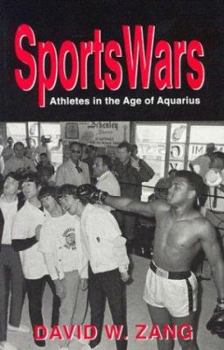SportsWars: Athletes in the Age of Aquarius
The Vietnam era's tensions-between tradition and new possibilities, black and white, young and old, male and female-were played out on the field of professional and organized sports. SportsWars shows... This description may be from another edition of this product.
Format:Hardcover
Language:English
ISBN:1557287139
ISBN13:9781557287137
Release Date:July 2001
Publisher:University of Arkansas Press
Length:180 Pages
Weight:1.05 lbs.
Dimensions:0.5" x 5.7" x 8.7"
Customer Reviews
1 rating
Dream On
Published by Thriftbooks.com User , 17 years ago
SPORTS WARS Reviewed by Richard Arlin (Dick) Stull, Department of Health and Physical Education, Humboldt State University, Arcata, California archived from Arete Sport Literature Association OCTOBER 5, 2004 Dream On It was 1970. I stared across my desk in my high school English class into the intense eyes of a guest lecturer -- a well-muscled, bearded ex-football player whom I'd seen for years on television destroying hapless NFL running backs. He had a message that astounded me: that football was a capitalist, racist, exploitive game -- and that he had just retired at the top of his career to try to affect social change. The class was silent. I considered whether I should hazard a question. Tentatively, I raised my hand and asked, "Don't you think you're being unrealistic and idealistic?" He looked through me and paused for a moment. "It starts with you," he said. Like those running backs I'd seen careening out of bounds after a jarring hit, I was shaken up. The player was former St. Louis Cardinals linebacker, Dave Meggyesy. A product of the Sixties, Meggyesy was one of many athletes who were outspoken about their political beliefs. The very meaning of sport in society was being challenged, not only by the athletes that played them, but also by students, academics, and even university administrators. Many also questioned not only the notion that athletic participation builds character but the methods used to "build character." These issues, according to author David Zang in his book Sports Wars: Athletes in the Age of Aquarius occurred in the Sixties on many fronts, from Muhammad Ali's defiance of the military draft, to the exposés and autobiographies that questioned every aspect of sport and the institutions that were part of sport. Well written, well referenced and thought provoking, this is a must-read for American Studies, American History, Sociology or anyone who is interested in the role of sport in American society. Zang writes: Many factors impinged on the old sports ideology-the quest for profits, television ratings points, and advertising dollars. Certainly, beginning in the 1950's, big money, television, and critical media helped to create a climate of inescapable scrutiny and overexposure that was inhospitable to myth making. But these things, along with a large influx of black athletes and the beginnings of female insistence on sharing the playing fields, were only parts of a fuller explanation. Money and celebrity were always a part of our sports, but what you cannot trace back beyond the Vietnam era is the cultural tension that undermined SportsWorld's claims to character building and the tenets by which organized sports were conducted: sacrificial effort, submission to authority, controlled physical dominance, victory with honor, and manliness (for, above all, organized sports were self-consciously male before this time). Zang opens his book with an account and analysis of the volatile reaction to singer/guitarist Jose Feli





